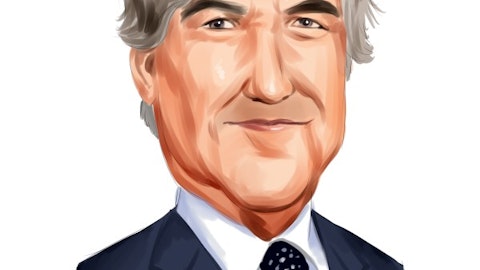Regarding the €“ your second question, unfortunately, I don’t have any update for you right now. The last update that we gave was through a formal communication, and that’s what we have to say, it’s written on the last communication that we did with the market.
Javier Martinez: But we’re supposed to be waiting for an answer from the Board, right?
Ari de Sa Cavalcante Neto: Yes, I believe so.
Javier Martinez: Okay. Okay. Thank you, Ari.
Ari de Sa Cavalcante Neto: Thank you. Thank you, Javier.
Operator: Thank you. The next question comes with Mauricio Cepeda with Credit Suisse. Please go ahead.
Mauricio Cepeda: Hello. Hello, guys. Thank you for the €“ for having the opportunity to put questions here. I have two questions, one related to the debts itself. So you €“ I understand from the speech that you are relying a lots on the operating cash flow to the leverage. But if you could maybe detect if there are other options to decrease to that level given it’s in kind of a considerable high level now. And the second one it’s related to Isaac now that the macroeconomics are deteriorating and the interests rates are up. If there would be problems in Isaac related to more delinquency or PDA or even if there could be a risk of adverse selection of wallets that are dealt by Isaac. Thank you
Roberto Otero: Hi, Cepeda, thanks for the questions. It’s Otero here. So as you said, I mean, we think we actually assured that the leverage will continue during 2023, okay? This will be mostly driven by EBITDA expansion, okay, for this year. So we expect the 3.1 times that we ended 2022 to be below 3 times at the end of 2023, okay? But as you said, I mean, we still have a relevant amount of sellers notes coming due this year, okay? As we show both in the presentation and the financial statements we continue to book International School as a short-term obligation. This is more a contractual obligation, but as you know, this is still under arbitration. And the most likely scenario is that International School will become €“ will come to a definition only in the beginning of next year, okay?
So in terms of outflow, we should not expect based on the information that we have today, and of course, the scenario can change that this outflow will only happen next year. Still in terms of balance sheet management what we’ll probably do is replace those sellers notes with banking loans along this year, okay? Despite the impact from the American as event in the market, we’re not seeing a negative impact in our ability to attract or to add those lines and financial institutions appetite to offer those lines to us, okay? So this will probably €“ this is what we’ll probably do, okay, in terms of balance sheet management, again replace sellers notes with banking loans, and we’re not seeing a negative impact in terms of appetite, our conditions for us to do so this year, okay?
So that will be the source of €“ the single source of incremental liquidity that we would plan to seek this year. Aside from that, the leverage will come from EBITDA expansion and operating cash flow generation mostly, okay? In terms of Isaac actually the collection period for Isaac is finishing right now, right? So after the completion of the enrollment process at schools, so the period between January and March is actually quite important. It’s actually what drives the result of the cycle for Isaac. So at this point, we can say that the collection performance was very good. It was much better than how the market performed in terms of NPLs and it was better than Isaac’s performance in the prior cycle, okay? So despite the deterioration in the macro environment in general driven by several factors, including the interest rates we did not see that affecting the collection or the ability to collect for Isaac.





